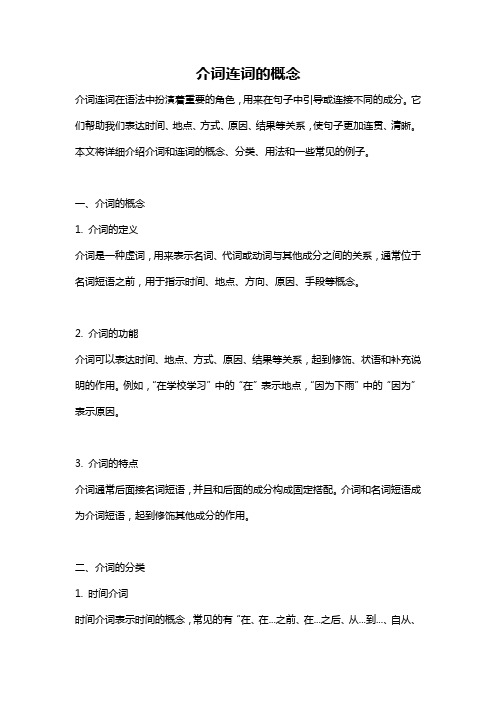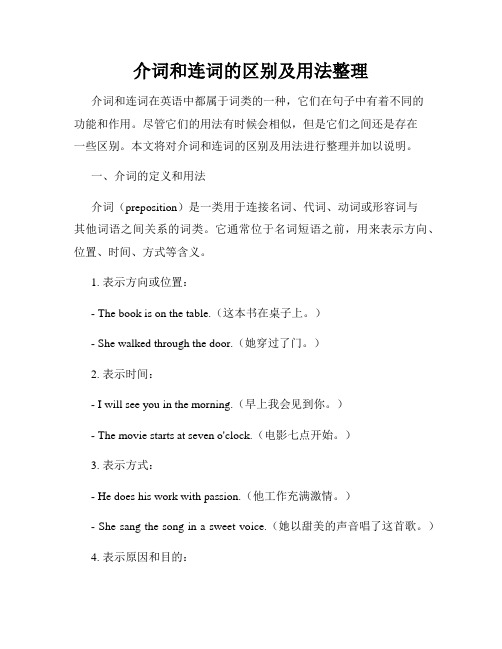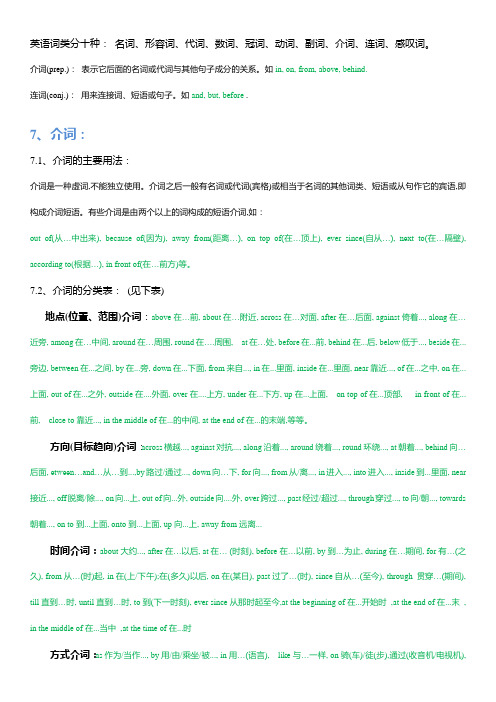介词和连词
介词和连词

介词和连词介词一. 介词的语法作用用来表明名词、代词与句中其他词的关系的词叫介词。
介词是虚词,不能重读,不能单独作句子成分,需要和它后面的词共同充当句子成分。
介词及其宾语在句中作定语、状语、表语及宾语补足语等成分。
如The key to the door is missing.(定语) Marx stayed in Belgium for some time and then went to France.(状语) Japan is to the east of China.(表语) Make yourself at home.(宾语补足语)二. 介词的分类1. 根据介词的构成形式可将介词分为以下几类:简单介词:at, by, for, in, on, from, during, past等复合代词:out of, onto, into, insede, without等短语介词:because of, instead of, in front of, by the end of等双重介词:from behind, from around, till after等动词的-ing形式介词:including, considering, regarding, concerning等2. 根据介词的意义可将介词为以下几类:○1表示方位和空间关系的介词:at, round, in, over, below, in front of, outside, among, away from, around, on, under, above, behind, inside, near to, off, beyond, past, across, over, up, opposite○2表示时间的介词:at, in, around, between, since, during, till, after, on, about, round, for, until, by, before, from …to …○3表示工具、手段、方式等的介词:like, in, with, by○4表示其他含义的介词:without, besides, with, except, instead of三. 常用介词的用法1. 表示时间的介词○1at, in, on和byA. at的用法:a.时间的一点、时刻等,如at 12:00, at noon, at night, at midnight, at dawn, at daybreakb. 较短暂的一段时间,可指某个节日或被认为是一年中标志大事的日子,如at Christams,at New Year, at the Spring FestivalB. in的用法:a. 表示在某个较长的时间内(如世纪、朝代、年代、月及泛指上午、下午和傍晚等),如in the 1980s, in Qing Dynasty, in October, in the morningb.表示在一段时间之后,如I’ll be back in an hour.C. on的用法:a.用于表示具体的日子或一个特定的时间,如某日、某节日、星期几等。
介词连词的概念

介词连词的概念介词连词在语法中扮演着重要的角色,用来在句子中引导或连接不同的成分。
它们帮助我们表达时间、地点、方式、原因、结果等关系,使句子更加连贯、清晰。
本文将详细介绍介词和连词的概念、分类、用法和一些常见的例子。
一、介词的概念1. 介词的定义介词是一种虚词,用来表示名词、代词或动词与其他成分之间的关系,通常位于名词短语之前,用于指示时间、地点、方向、原因、手段等概念。
2. 介词的功能介词可以表达时间、地点、方式、原因、结果等关系,起到修饰、状语和补充说明的作用。
例如,“在学校学习”中的“在”表示地点,“因为下雨”中的“因为”表示原因。
3. 介词的特点介词通常后面接名词短语,并且和后面的成分构成固定搭配。
介词和名词短语成为介词短语,起到修饰其他成分的作用。
二、介词的分类1. 时间介词时间介词表示时间的概念,常见的有“在、在...之前、在...之后、从...到...、自从、当、一直到”等。
例如,“在早上、在下午、在晚上”等。
2. 地点介词地点介词表示地点的概念,常见的有“在、去、到、从...来、从...出发、进入、离开、靠近”等。
例如,“在家、去学校、到中国、离开公司、靠近河边”等。
3. 方式介词方式介词表示方式、手段的概念,常见的有“用、用...做、以、通过、靠、依靠”等。
例如,“用电脑、用汉语、以书面形式”等。
4. 原因介词原因介词表示原因、理由的概念,常见的有“因为、由于、为了”等。
例如,“因为下雨、由于他的努力、为了考好成绩”等。
5. 结果介词结果介词表示结果、目的的概念,常见的有“使、叫、让、以便”等。
例如,“使他开心、叫他来、让他学习、以便配合工作”等。
三、连词的概念1. 连词的定义连词也是一种虚词,用来连接句子、短语或词语,起到连接、衔接不同成分的作用。
连词包括并列连词、从属连词和对等连词。
2. 并列连词并列连词用来连接相同地位的两个句子、词语或短语,表示相互之间的并列关系。
常见的并列连词有“和、或、但、而、于是、所以”等。
介词和连词的区别及用法整理

介词和连词的区别及用法整理介词和连词在英语中都属于词类的一种,它们在句子中有着不同的功能和作用。
尽管它们的用法有时候会相似,但是它们之间还是存在一些区别。
本文将对介词和连词的区别及用法进行整理并加以说明。
一、介词的定义和用法介词(preposition)是一类用于连接名词、代词、动词或形容词与其他词语之间关系的词类。
它通常位于名词短语之前,用来表示方向、位置、时间、方式等含义。
1. 表示方向或位置:- The book is on the table.(这本书在桌子上。
)- She walked through the door.(她穿过了门。
)2. 表示时间:- I will see you in the morning.(早上我会见到你。
)- The movie starts at seven o'clock.(电影七点开始。
)3. 表示方式:- He does his work with passion.(他工作充满激情。
)- She sang the song in a sweet voice.(她以甜美的声音唱了这首歌。
)4. 表示原因和目的:- They went to the park for a walk.(他们去公园散步。
)- She studies hard for good grades.(为了好成绩,她努力学习。
)二、连词的定义和用法连词(conjunction)是连接词语、短语或句子的词类。
它用来连接句子或句子中的成分,使句子关系更加密切、连贯、完整。
1. 表示并列关系:- I like pizza and she likes spaghetti.(我喜欢比萨,她喜欢意大利面。
)- He is tall but his brother is short.(他很高,但他的兄弟很矮。
)2. 表示选择关系:- Do you want tea or coffee?(你想要茶还是咖啡?)- You can either go with us or stay at home.(你要么跟我们一起去,要么待在家里。
连词与介词的区别

连词与介词的区别我们在学习一种语言的时候经常会学习的语言的语法,那么你知道连词和介词的区别是什么吗?下面是店铺为你整理的连词与介词的区别,供大家阅览!介词和连词的区别:介词不能单独作句子成分,但介词在介词短语中是两个实质性结构成分中(介词+名词性词语)的一个;而连词在实质性结构中只起连接作用。
下面以“和”为例谈谈如何区别介词和连词。
①当“和”作介词的时候,“和”前后的成分不能互换,前面可加副词作状语,后面可以有停顿。
②当“和”作连词的时候,“和”前后的成分可以互换,前面不能加副词性修饰成分,后面不能停顿。
一、介词的分类与语法功能1. 介词是虚词,不能单独作句子成分,必须与名词、代词(或相当于名词的其他词类、短语或从句等)构成介词短语,在句中充当一个成分。
介词分为:① 简单介词,如at、in、for等;② 合成介词,如within、inside、onto、througout等;③ 短语介词,如according to、out of、because of、by means of、in spite of、instead of等。
④ 双重介词,如from behind / above / under、until after等。
⑤ 分词介词,如considering、including、judging(from / by) 等。
常见的介词宾语:名词、代词、动名词、从句、不定式等。
如:①It is going to rain this afternoon according to the weather forecast.②He quarrelled w ith her yesterday.③He succeeded in passing the final exam.④I’m still thinking of how I can fulfil the task ahead of time.⑤The professor will give us a talk on how to study English well.2. 介词短语在句中可作表语、定语、状语和宾补等。
英语介词和连接词

英语词类分十种:名词、形容词、代词、数词、冠词、动词、副词、介词、连词、感叹词。
介词(prep.):表示它后面的名词或代词与其他句子成分的关系。
如in, on, from, above, behind.连词(conj.):用来连接词、短语或句子。
如and, but, before .7、介词:7.1、介词的主要用法:介词是一种虚词,不能独立使用。
介词之后一般有名词或代词(宾格)或相当于名词的其他词类、短语或从句作它的宾语,即构成介词短语。
有些介词是由两个以上的词构成的短语介词,如:out of(从…中出来), because of(因为), away from(距离…), on top of(在…顶上), ever since(自从…), next to(在…隔壁), according to(根据…), in front of(在…前方)等。
7.2、介词的分类表:(见下表)地点(位置、范围)介词:above在…前, about在…附近, across在…对面, after在…后面, against倚着..., along在…近旁, among在…中间, around在…周围, round在….周围, at在…处, before在...前, behind在...后, below低于..., beside在...旁边, between在...之间, by在...旁, down在...下面, from来自..., in在...里面, inside在...里面, near靠近..., of在...之中, on在...上面, out of在...之外, outside在....外面, over在....上方, under在...下方, up在...上面, on top of在...顶部, in front of在...前, close to靠近..., in the middle of在...的中间, at the end of在...的末端,等等。
介词与连词的区别

介词与连词的区别介词和连词是语法中常见的两个词类,它们在句子中起着连接词与词、短语与短语、句子与句子之间的作用。
虽然它们都有连接的作用,但是介词和连词在使用时有一些区别。
本文将从定义、功能和用法等方面介绍介词和连词的区别。
一、介词的定义和功能介词是一种独立的词类,用来在短语或从句中连接名词、代词、动词或副词等。
介词通常置于名词、代词或短语之前,起到修饰、限定或说明名词、代词的作用。
此外,介词还可以表示时间、地点、原因、方式、比较、目的等关系。
举例来说,以下是一些常用的介词:- in(在)- on(在...上)- at(在...处)- by(由...)- for(为...)- from(从...)在句子中,介词与它所连接的名词、代词、短语等构成介词短语,并在句子的结构中起到修饰、补充或限制的作用。
例如:1. I live in a small town.(我住在一个小镇上。
)2. She left the book on the table.(她把书放在桌子上。
)3. We go to school by bus.(我们坐公交车上学。
)二、连词的定义和功能连词也是一种独立的词类,用来连接短语、从句或句子。
连词通常用于连接并列的词、短语、从句或句子,使得它们之间有一定的逻辑关系。
连词可以用来表达并列、递进、转折、因果等关系。
以下是一些常见的连词:- and(和)- but(但是)- or(或者)- so(所以)- because(因为)- although(尽管)在句子中,连词在语法结构上连接两个或多个并列的词、短语、从句或句子,并起到使它们之间具有逻辑关系的作用。
例如:1. I like apples and oranges.(我喜欢苹果和橙子。
)2. He is rich, but he is not happy.(他很富有,但他并不快乐。
)3. I will visit London or Paris next week.(下周我将访问伦敦或巴黎。
介词和连词
介词1.介词定义:介词是一种虚词,在句子中不能单独作句子成分。
介词一般用于名词或名词性结构之前,介词后面的名词或者相当于名词的词语叫作介词宾语,介词和它的宾语一起构成介词短语。
例如:at school (school是介词宾语,at school是介词短语)2.介词分类:①简单介词:about, on②合成介词:onto, without③短语介词:according to, along with3.介词的特殊用法:(一)表示时间的介词的用法比较。
①in, on, at用法:in表示一天中的一部分,或者周、月、季、年、世纪等。
at表示某一时间点或者一天中的某一个时间,以及圣诞节等。
on表示具体的某一天,或者某一天的上午、下午、晚上等。
例如:in the morning in Marchat noon at Christmason July on one’s birthday②in, after用法:in表示从说话时算起若干时间以后,经常与将来时连用。
after表示过去的一段时间以后,此时它用于过去时态。
after也可以表示将来的某一时刻之后,此时它用于将来时态。
例如:He will arrive in two hours.She started after two days.He will come back after June.③from, since用法:from不用于说明某动作或者情况持续了多久,而仅说明什么时候开始。
since表示持续到说话时的动作或者情况开始于什么时候,通常和现在完成时连用。
例如:He began to learn English from the age of five.He has been here since September 1995.(二)表示地点的介词的用法比较。
①at, in, on用法:at用于指较小的地方。
in与城市、地区、国家等较大的地方连用。
介词与连词的区别
关键知识点总结回顾
使用规则与注意事项
连词连接的两个部分 通常具有相同的语法 功能。
介词后通常跟名词或 代词作宾语,构成介 词短语。
相关语言现象拓展延伸
介词短语的功能
介词与连词的固定搭配
介词短语在句子中可作状语、定语或 表语,对句子的意思起到重要的修饰 和补充作用。
英语中有一些固定的介词与连词搭配 ,如"because of"、"in spite of"等 ,这些搭配具有特定的含义和用法。
04
介词与连词比较
语义功能比较
介词
主要表示名词或代词与句子其他成分之间的空间或时间关系,如“在”、“从 ”、“到”等。介词不能单独作句子成分,必须与名词、代词等组成介词短语 才能充当句子成分。
连词
主要用来连接词、短语、分句或句子,表示它们之间的逻辑关系,如“和”、 “或”、“因为”等。连词可以单独作句子成分,连接两个并列的成分。
02
需要注意的是,不同的介词在句 子中的位置可能会有所不同,需 要根据具体的语境和语法规则来 判断。
03
连词详细解析
连词种类及用法
并列连词
转折连词
用来连接两个并列的词、短语或句子,如 “和”、“及”、“与”等。例如:“我 喜欢吃苹果和橙子。”
用来表示意思的转折或对比,如“但是” 、“然而”、“尽管”等。例如:“他很 聪明,但是不爱学习。”
05
常见问题与误区
介词误用为连词现象分析
介词被误用为连词的情况通常出现在复杂的句子结构中,例如
“关于这个问题,我认为,由于他的经验不足,导致了错误的决策。”这里的“关于” 应该被替换为“对于”或“就”,以保持句子的连贯性。
另一个例子是
中的介词和连词形式和用法有哪些
中的介词和连词形式和用法有哪些介词是连接词语与词组、句子成分的虚词,用来表示词语之间的关系。
连词是连接两个句子、短语或词语的虚词,用来表示句子之间的关系。
在中文中,介词和连词形式和用法有以下几种:一、介词形式和用法:1. 单音节介词:- 在:表示时间、地点、方式- 经:表示通过、经过- 自:表示起点、出发地- 向:表示方向、目的地- 跟:表示随着、陪伴- 对:表示所指对象、目标等等。
2. 双音节介词:- 关于:表示涉及到的范围、内容- 除了:表示排除之外的内容- 根据:表示以某个标准、理由- 按照:根据某个规定、计划- 由于:表示原因、起因等等。
3. 介词短语:- 在……之中:表示在某个范围、选择之间- 在……方面:表示在某个领域、方面- 对于……来说:表示针对某个人、群体来说- 为了……而:表示出于某个目的、原因- 由于……而:表示因为某个原因、结果等等。
二、连词形式和用法:1. 并列连词:- 和:连接同等重要的词语、短语、句子- 或:表示选择关系,包括两项或多项选其一- 与其……不如:表示选择关系,意味着选取前者更好的情况 - 不但……而且:表示两个或多个并列的事实、情况等等。
2. 递进连词:- 而:表示事实、情况之间的递进关系- 况且:表示前面已有足够的理由,不需要多说- 再者:表示进一步的补充、说明- 还有:表示除了前面提到的之外,还有其他的内容等等。
3. 因果连词:- 因为:表示原因、起因- 所以:表示由于某个原因而导致的结果、推论- 由于:表示由于某个原因而产生的结果- 既然:表示既然已经知道某个前提条件,就会有相应的结论等等。
4. 转折连词:- 但是:表示与前面的情况对比,有相反的意义- 然而:表示与前面的情况对比,有转折的意义- 反而:表示与前面的情况刚好相反- 并非:表示与前面的情况相反,是否定前面的说法等等。
5. 条件连词:- 如果:表示前提条件成立时,会有相应的结果- 只要:表示只要符合某个条件,就会有相应的结果- 无论:表示不管什么情况下,都会有相同的结果- 假如:表示假设是否定的情况下,会有相应的推论等等。
现代汉语介词、连词
夏后氏以松,殷人以柏。(《论语·八佾》)
夏后氏以松制造牌位,殷人以柏制造牌位。
引入行为动作发生的原因
扶苏以数谏故,上使外将兵。(《史记·陈涉起义》)
而吾以捕蛇独存。(《捕蛇者说》)
引入行为动作的时间
文以五月五日生。(《史记·孟尝君列传》)
明法度,定律令,皆以始皇起。(《史记·李斯列传》)
动词,用
引入行为动作的时间
引入行为动作的处所
“于”当是“吁”的本字,本义是口出气。假借来表示存在义,并虚化为介词。“於”、“乎”上古均与“于”音近(于,匣母鱼部;於,影母鱼部;乎,匣母鱼部),也被假借来表示介词“于”的用法。故三字在介词用法上相通。 皇皇者华,于彼原隰。(《诗经·皇皇者华》) 宋公及楚人战于泓。(《左传·僖公二十二年》)
工具、材料等实物
抽象的条 件
资格 身份 地位
原 因
引入从事行为动作时的资格、身份、地位
以人民往观之者三二千人。(《西门豹治邺》)
骞以郎应募使月氏。(《汉书·张骞传》)
3、为(wèi)爲源自 引入行为动作的原因天行有常,不为尧存,不为桀亡。(《荀子·天论》)
阍人为君在,弗内也。(《礼记·檀弓》)
引入行为动作的目的
天下熙熙,皆为利来。(《史记·货殖列传》)
今为宫室之美而为之。(《孟子·告子》)
引入行为动作的主动者,被动句式,读第2声。
而身为宋国笑。(《守株待兔》)
夫山木为良匠所度。(《文心雕龙》)
动词,做
服务对象
关涉对象
原 因
主 动者
目 的
二、连 词
用来连接词、词组、句子以及段落,表示两部分之间各种关系的词。
引入行为动作涉及的对象
闻之,有献于公。(《郑伯克段于鄢》)
- 1、下载文档前请自行甄别文档内容的完整性,平台不提供额外的编辑、内容补充、找答案等附加服务。
- 2、"仅部分预览"的文档,不可在线预览部分如存在完整性等问题,可反馈申请退款(可完整预览的文档不适用该条件!)。
- 3、如文档侵犯您的权益,请联系客服反馈,我们会尽快为您处理(人工客服工作时间:9:00-18:30)。
介词和连词介词是用来表明词与词ˎ句与句之间关系的词。
介词是虚词,不能重读,不能单独做成分,后面一般有名词ˎ代词或相当于名词的其它词ˎ短语或从句做它的宾语。
介词和它的宾语一起构成介词短语,在句中做定语ˎ状语ˎ表语ˎ补足语。
知识点一:.介词的分类1.形式上的分类类别特点例词简单介词由一个词构成at ,about, above , across, after, against, along, among, around, before, behind, below, between合成介词由两个合在一起构成without,within,nearby,inside,throughout, into, onto,outside短语介词由几个介词或一个介词和其它词构成regardless of, because of, thanks to, owing to, as aresult/consequence of, rather than, apart from,except for, but for, in place of, in front of, at thetop/bottom of, on behalf of, in case of分词介词部分动词的-ing用作介词considering, regarding, depending on, concerning, including,2.意义上的分类类别例词时间介词at, in, on, since, for, during, until, till, by, before, after, between, from...to, throughout地点介词at, in , on, around, above, below , over, in front of, behind, inside, outside, beside, next to, close to, near, by, across, opposite, through, within, onto, into, off , towards, to, from... to, among, against(倚靠)原因介词because of, for, at, with, from比较介词as, like, over(超过), to(与...相比)条件介词but for(要不是),considering(考虑到),in case of 让步介词despite, in spite of, regardless of其它介词for(支持),against(反对),without/with(没/有),besides, except/ but/other than(除了),instead of,知识点二:常用介词的用法1.at1). 在某处at the corner of the street at the concert at home arrive at the station2). 处于…状态at war at lunch at work at table at a disadvantageat sb/sth’s best/worst3). 在...时刻/钟点/时期/岁at that moment at noon at dawn at dusk at night at sunrise at daybreak at the weekend at the age of at Christmas at 2 o’clock4).以...速度/价格/代价at a speed of 80 kph at full/high speed at a high/low priceat the expense of at a rate of5).at+名词表示“一......就”at the sight of at the sound of at the thought of6).at与动词连用,表示“对/朝/向(目标,方向等) ”aim at laugh at shoot atthrow sth at point sth at7)表示“应......邀请/请求/号召/吩咐”at our request at the chairman’s invitationat one’s command8).与形容词连用,表“因...而”“在...方面”be surprised at sth be astonished at sthbe shocked at be angry at be disappointed at sth be good at paintingbe delighted at the result be impatient at the delay9).其它:call me at 637-22332.in1). 在...时间内in the morning/afternoon/evening in spring/summer/autumn/winterin the fall of 2016 in January2). 在(某段时间)之后in a few days in a month in a week’s time3). 在...空间/范围内in Africa be lying in bed read about the accident in the newspaper4). 处于...状态in good/bad condition in a good state in danger in debtin despair in ruins in trouble in use in operation in preparation in love5). 表示使用语言,材料等say it in English in pencil put it in writing pay in cash speak in a loud voice6). 其它:be dressed in their best clothes in a row three metres in length in tearsin an attempt to in total in comfort in conclusion in consequence in principlein depth in detail in disguise in effect in practice in existence in casein store in person in place in need in demand in order in sight3.on1). (覆盖,附着)在...之上(尤指某物的表面上) on the wall on the Thameson the surface of the lake hit sb on the head2). 表时间,在特定的日子里on Sunday on May the first on the morning of March 8thOn Christmas Day on your birthday on one occasion3). 关于give a talk on the economic situation differ from each other on some important mattersa ban on smoking4). 处于活动或状态中be on business/holiday/vacation a soldier on watch be on fire5). 按照,凭,根据,靠act on his advice live on rice be based on facts6). 就在...之后,一...就(后接名词或动名词) on his arrival/return on arriving homeon hearing the news7). 其它:stand on one foot hang your coat on that hook come on my bike Have you got any money on you be on the committee on our sidetalk on the telephone a town on the coast4.for1). 为了,给,替(表示目的,对象) come here for advice prepare for a meetinga book intended for children a knife for cutting breadHere’s a letter for you wok for IBM2). 历经,计,达(表示时间,距离,数量) The bad weather has lasted for an entire weekwalk for miles3). 支持,赞成Are you for or against the proposal? vote for giving up smoking4). 由于,因为be famous for its hot springs be praised for his good deedsget an award for bravery5). 当做,作为What did you have for lunch? Don’t take him for a foolYou must have mistaken me for Lisa6). 其它:. I’ll swap these two bottles for that one. That’s too much responsibility for a child The box is too heavy for me to lift They are anxious for her safetyShe has an ear for music have a gift for writingfor ever永远地for sale for free/nothing免费for all 虽然,尽管5.by1). 在...旁边,靠近stand by the window Come and sit by me2). 用,靠,通过,借助于(表示方式,手段) by train/air/plane/sea/ship/land/bus/carmake a living by selling newspapers know sb by name pay by chequecontact you by letter or by telephone3). 不迟于,在...之前return the book by FridayBy the time this letter reaches you ,I will have left the country.4). 按照,以(表示数量,尺寸,程度等,单位词前用the) be paid by the day/hoursell it by the meter judge a man by his looks/clothes5) 表示程度,数量The bullet missed him by two inches(子弹以两英寸之差未击中他)He is taller than his father by a head/two centimetersHouse prices went up by 10%6). 表示触及或抓住的人或物的部分take him by the hand seize him by the hairpick it up by the handle7). 其它:be knocked by a bus meet by chance take my umbrella by mistakewith time going by work by candlelight6.against1). 以......为背景,衬托。
